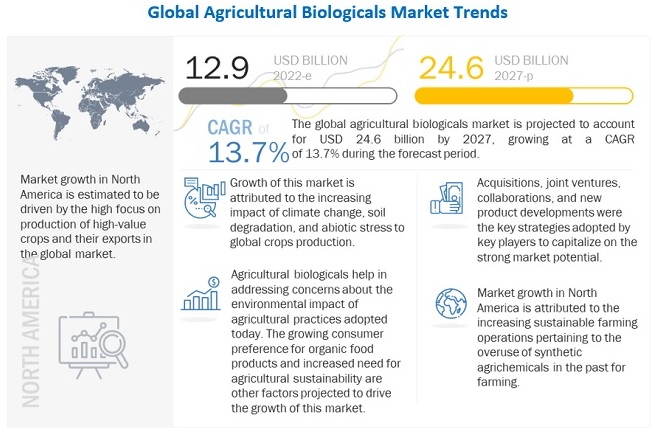
The agricultural biologicals market is estimated at USD 12.9 billion in 2022; it is projected to grow at a CAGR of 13.7% to reach USD 24.6 billion by 2027. The rise in the population and increased consumption of food products across regions are the key factors that have led to a substantial increase in food production. Farmers focus on opting for conventional chemical-based fertilizers to increase yield and meet the domestic as well as international demands. This repeated use of chemical fertilizers has led to the degradation of soil and water quality. Strong initiatives toward organic farming and the increasing awareness of environmental protection have encouraged the demand for agricultural biologicals in the agriculture industry.
Download PDF brochure: https://www.marketsandmarkets.com/pdfdownloadNew.asp?id=100393324
Leading players profiled in this report:
• BASF (Germany)
• Syngenta (Switzerland)
• Bayer AG (Germany)
• UPL (India)
• Marrone Bio Innovation, Inc (US)
• Gowan Company (US)
• Vegalab SA (Switzerland)
The Biocontrol segment by function is projected to observe the fastest growth in the Agricultural Biologicals market throughout the forecasted period
Biocontrol is estimated to be the largest subsegment under type. Biological control (biocontrol) is a broad term that refers to the use of one organism to control another. It can be used to restore some of the regulating factors that limit a pest’s competitive ability. Biocontrol involves using living organisms, such as insects, pathogens, or even grazing animals, to suppress weed infestation or plant diseases.
The Microbial segment by product type is estimated to account for the largest market share in the global Agricultural Biologicals market
The ability to boost nutrient availability in the soil and increase plant yield to promote microbial segment growth. Microbials are effective against target pests and do not react against beneficial and non-targeted pests. Microbial biofertilizers are generally derived from bacterial sources. Bacterial genus such as Rhizobium, Azotobacter, Azospirillum, Cyanobacteria, and Azolla help in enhancing nitrogen content in the soil, thereby enhancing the crop yield.
The foliar spray sub-segment of the by mode of application segment is projected to attain the fastest market growth in Agricultural Biologicals market over the forecast period.
Foliar spray is a common mode of application for biocontrol methods, while seed treatment and soil treatment are generally preferred for biostimulants and biofertilizers. This has led to an increase in demand for foliar spray compared to soil or seed treatment solutions. Foliar spraying can help plants recover fast from stresses caused by nutrient deficiencies, water scarcity, extreme temperatures, pests, and diseases. Foliar fertilizer application can be an effective way to increase crop yield and get a quick response. It promotes nutrient balance inside the plant and across a field, according to scientists.
Request Sample Pages: https://www.marketsandmarkets.com/requestsampleNew.asp?id=100393324
The fruits and vegetables segment by the crop type is estimated to account for the largest market share in the global Agricultural Biologicals market
The fruits and vegetables segment accounted for the largest share due to their high global demand. In addition, the ban on the production of chemicals for vegetables and fruits is expected to discourage farmers from opting for sustainable cultivation methods. Farmers that grow vegetables and fruits typically make large, long-term investments in their fields, and their crops are perishable. As a result, growers are especially receptive to the benefits of biostimulants, such as improved plant health, pest and disease resistance, drought tolerance, and yields.
